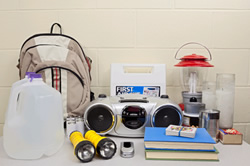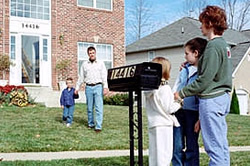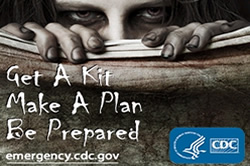Preparedness 101: Zombie Apocalypse
Credit Ali S. Khan CDC

There are all kinds of
emergencies out there that we can prepare for. Take a zombie apocalypse
for example. That’s right, I said z-o-m-b-i-e a-p-o-c-a-l-y-p-s-e. You may
laugh now, but when it happens you’ll be happy you read this, and hey,
maybe you’ll even learn a thing or two about how to prepare for a real
emergency.
A Brief History of
Zombies
We’ve all seen at least one movie about flesh-eating zombies taking over
(my personal favorite is Resident Evil), but where do zombies come from
and why do they love eating brains so much? The word zombie comes from
Haitian and New Orleans voodoo origins. Although its meaning has changed
slightly over the years, it refers to a human corpse mysteriously
reanimated to serve the undead. Through ancient voodoo and folk-lore
traditions, shows like the Walking Dead were born.

A couple dressed as zombies - Danny Zucco and Sandy Olsson from the
movie Grease walking in the annual Toronto Zombie Walk.
In movies, shows, and
literature, zombies are often depicted as being created by an infectious
virus, which is passed on via bites and contact with bodily fluids.
Harvard psychiatrist Steven Schoolman wrote a (fictional) medical paper on
the zombies presented in Night of the Living Dead and refers to the
condition as Ataxic Neurodegenerative Satiety Deficiency Syndrome caused
by an infectious agent. The Zombie Survival Guide identifies the cause of
zombies as a virus called solanum. Other zombie origins shown in films
include radiation from a destroyed NASA Venus probe (as in Night of the
Living Dead), as well as mutations of existing conditions such as prions,
mad-cow disease, measles and rabies.
The rise of zombies in pop
culture has given credence to the idea that a zombie apocalypse could
happen. In such a scenario zombies would take over entire countries,
roaming city streets eating anything living that got in their way. The
proliferation of this idea has led many people to wonder “How do I prepare
for a zombie apocalypse?”
Well, we’re here to answer
that question for you, and hopefully share a few tips about preparing for
real emergencies too!
Better Safe than
Sorry

Some of the supplies for your emergency kit.
So what do you need to do
before zombies…or hurricanes or pandemics for example, actually happen?
First of all, you should have an emergency kit in your house. This
includes things like water, food, and other supplies to get you through
the first couple of days before you can locate a zombie-free refugee camp
(or in the event of a natural disaster, it will buy you some time until
you are able to make your way to an evacuation shelter or utility lines
are restored). Below are a few items you should include in your kit, for a
full list visit the CDC Emergency page.
- Water
(1 gallon per person per day)
- Food
(stock up on non-perishable items that you eat regularly)
- Medications
(this includes prescription and non-prescription meds)
- Tools and
Supplies (utility knife, duct tape, battery powered radio,
etc.)
- Sanitation and
Hygiene (household bleach, soap, towels, etc.)
- Clothing and
Bedding (a change of clothes for each family member and
blankets)
- Important
documents (copies of your driver’s license, passport, and birth
certificate to name a few)
- First Aid
supplies (although you’re a goner if a zombie bites you, you
can use these supplies to treat basic cuts and lacerations that you
might get during atornado or hurricane)
Once you’ve made your
emergency kit, you should sit down with your family and come up with an
emergency plan. This includes where you would go and who you
would call if zombies started appearing outside your door step. You can
also implement this plan if there is a flood, earthquake, or other
emergency.

Family members meeting by their mailbox. You should pick two meeting
places, one close to your home and one farther away.
Identify the types of
emergencies that are possible in your area. Besides a zombie apocalypse,
this may include floods, tornadoes, or earthquakes. If you are unsure
contact your local Red Cross chapter for more information.
Pick a meeting place for
your family to regroup in case zombies invade your home…or your town
evacuates because of a hurricane. Pick one place right outside your home
for sudden emergencies and one place outside of your neighborhood in
case you are unable to return home right away.
Identify your emergency
contacts. Make a list of local contacts like the police, fire
department, and your local zombie response team. Also identify an
out-of-state contact that you can call during an emergency to let the
rest of your family know you are ok.
Plan your evacuation
route. When zombies are hungry they won’t stop until they get food
(i.e., brains), which means you need to get out of town fast! Plan where
you would go and multiple routes you would take ahead of time so that
the flesh eaters don’t have a chance! This is also helpful when natural
disasters strike and you have to take shelter fast.
Never Fear – CDC is
Ready

Get a Kit, Make a Plan, Be Prepared
If zombies did start roaming
the streets, CDC would conduct an investigation much like any other
disease outbreak. CDC would provide technical assistance to cities,
states, or international partners dealing with a zombie infestation. This
assistance might include consultation, lab testing and analysis, patient
management and care, tracking of contacts, and infection control
(including isolation and quarantine). It’s likely that an investigation of
this scenario would seek to accomplish several goals: determine the cause
of the illness, the source of the infection/virus/toxin, learn how it is
transmitted and how readily it is spread, how to break the cycle of
transmission and thus prevent further cases, and how patients can best be
treated.
Not only would scientists be working to identify the cause and
cure of the zombie outbreak, but CDC and other federal agencies would send
medical teams and first responders to help those in affected areas (I will
be volunteering the young nameless disease detectives for the field work).
To learn more about how you
can prepare for and stay safe during an emergency visit:
http://emergency.cdc.gov/
|







